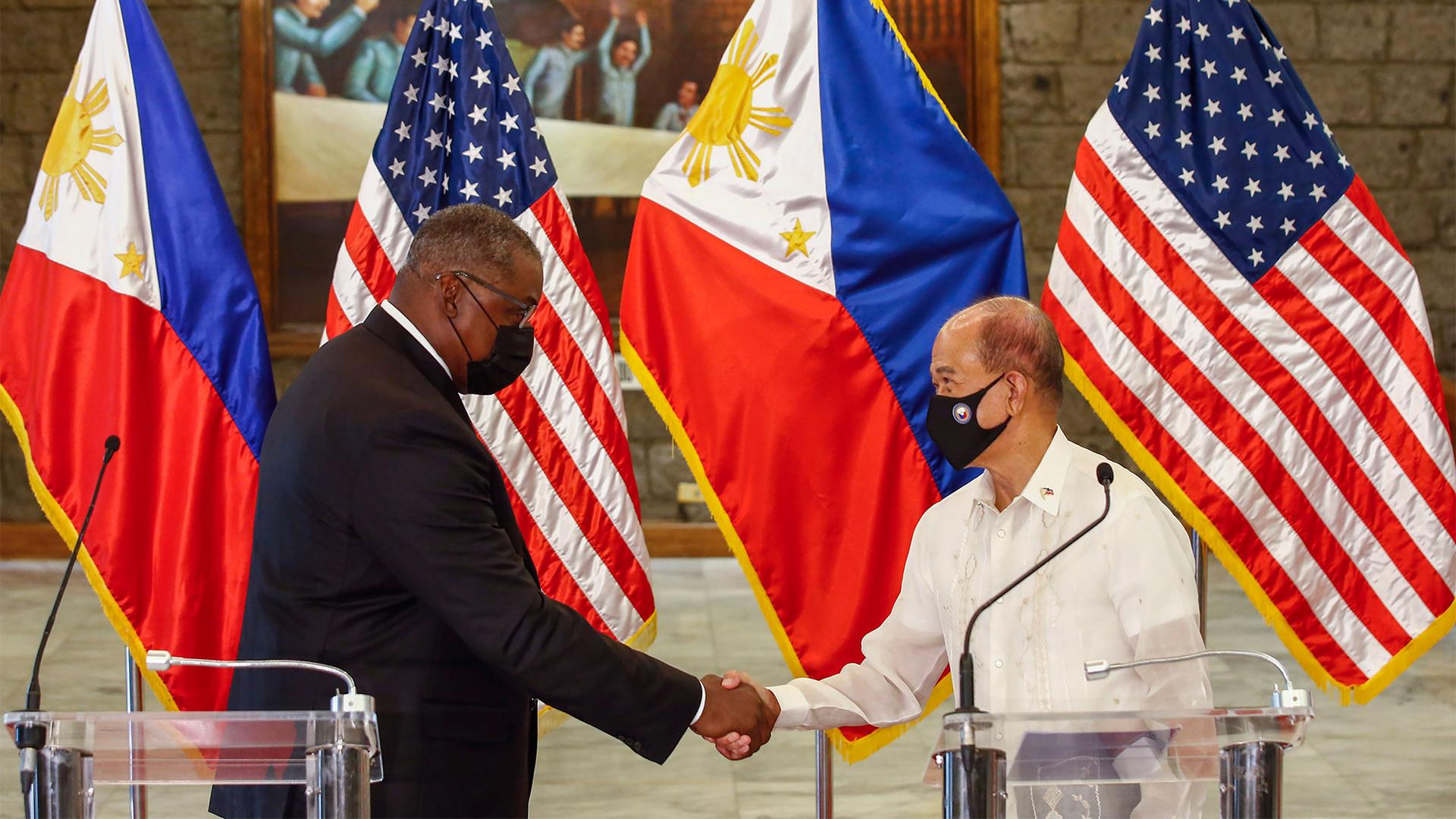Philippine president reverses threat to void long-standing defense deal with the US
The president of the Philippines has reversed his decision to void a long-standing defense agreement between his country and the United States, after more than a year of threatening to scrap it.
“One of the reasons I’m here today is to reaffirm the US security commitment to the Philippines is iron-clad and that commitment, as Secretary Blinken stated a while back, extends to the South China Sea,” US Defense Secretary Lloyd Austin said on Friday in the Philippine capital Manila during a joint press conference with counterpart Delfin Lorenzana.
“There is no termination letter pending and we are back on track.”
“The president decided to recall or retract the termination letter for the VFA,” Lorenzana said. “There is no termination letter pending and we are back on track.”
Analysts say the continuation of the Visiting Forces Agreement, or VFA, hands the Biden Administration a crucial win in an ongoing power struggle between Washington and Beijing in the region. US military presence counteracts China’s growing influence in Southeast Asia and the South China Sea, which Beijing claims entirely as its own.
Early last year, President Rodrigo Duterte announced that he intended to abrogate the VFA, initially signed in the late 1990s that now serves as the legal framework allowing for US troops in the Philippines, despite a constitutional ban on foreign military in the country.
Duterte made the announcement after the US canceled the visa of Philippine Sen. Ronald dela Rosa, former police chief of the Philippines, who led the president’s deadly yearslong anti-drug campaign.
“[Duterte is] very resistant to any kind of pressure on his human rights abuses, so he canceled the Visiting Forces Agreement.”
“He’s very resistant to any kind of pressure on his human rights abuses, so he canceled the Visiting Forces Agreement,” said Aaron Connelly, a research fellow in Southeast Asian politics and foreign policy at the International Institute for Strategic Studies in Singapore.
Related: Filipinos hesitant about getting COVID jab after dengue fever vaccine debacle
The threat to scrap the VFA also came after years of Duterte taking up pro-Beijing policy stances and pushing a narrative of anti-Americanism and Filipino nationalism.
“We can handle our own affairs,” Duterte said, defending his decision to end the pact during a speech in February 2020. “If we can’t, we have no reason for being a republic.”
The US provides millions of dollars in military hardware to the Philippines as part of the agreement, said Jose Antonio Custodio, a military historian and defense analyst based in Manila.
“For a military that is constantly delaying its modernization program because of fiscal limitations, assistance coming from the Americans is very important.”
“For a military that is constantly delaying its modernization program because of fiscal limitations, assistance coming from the Americans is very important,” he said.
Meanwhile, the VFA allows the US and Philippines to continue to hold annual joint exercises, including Balikaton, and to collaborate on humanitarian missions and share intelligence about terrorist groups.
Related: Duterte’s ‘weaponization of the law’ is a threat to democracy, says journalist Maria Ressa
When President Rodrigo Duterte threatened to end the agreement, it was a big deal.
But the VFA never officially ended, thanks, in part, to a mechanism within the agreement that allows for a six-month waiting period after the Philippines gives notice of intentions to void the agreement. Every time those six months expired, the president kicked the official voidance of the agreement down the road.
Connelly said a number of things could have contributed to the reversal announced on Friday, including assurances from the US and political pressure from the public, after months of Chinese military ships entering parts of the South China Sea that are claimed by the Philippines.
Related: In 2020, the courts will continue to be a player in climate change
“[Duterte] may need American forces to further deter Chinese aggression.”
“And this was causing a lot of political pressure on Duterte in the Philippines because he was seen as weak in defending Philippine sovereignty,” Connelly said. “He may need American forces to further deter Chinese aggression.”
Still, while the news that the VFA will continue is a policy success for Washington and sends a strong message to Beijing, Connelly warns against thinking the agreement is completely safe, because President Duterte has nearly a year left in office, and his reputation for being a bit of a loose cannon could threaten the agreement again.
Meanwhile, the public is still very pro-American and supportive of the Visiting Forces Agreement, according to analyst Jose Antonio Custodio.
“And that’s one of the things that constrains the Duterte administration from going totally pro-China, or the Chinese from making successful inroads into the Philippines,” Custodio said.
Custodio added that Duterte can’t afford to make powerful enemies right now, as he is also facing charges of war crimes at the International Criminal Court for his anti-drug campaign.
